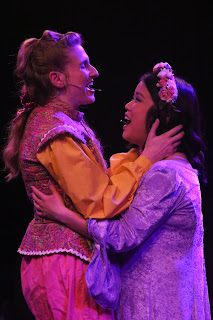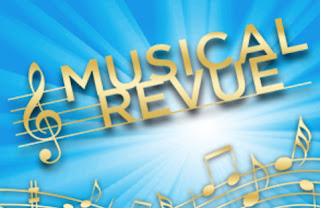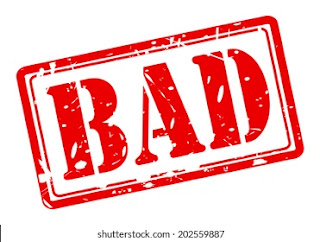Go round and round,
Like light and light,
Descending day,
And breaking night.
Our roads shall shortly separate;
What may endure we now create;
Remember now this present sweet;
We are alive.
We got the beat.
It's such a lovely goodbye to the audience. Life is about circles and patterns and cycles (which is a poet's term. So.), and the trick is to learn from these circles so that each time they roll around again we handle it or understand it a little better, and maybe grow a little too. That's essentially the plot of Head Over Heels, and not incidentally, almost every story based on the Hero Myth (Star Wars, Wizard of Oz, etc.).
Our actors mock me because I use circles so often in my staging, but that's because I learned from Hair that the circle is very, very powerful. It represents pretty much everything in life. Including Life.
Just as the Arcadians in Head Over Heels go in search of themselves and end up back where they started, so too did the New Liners over the last two years. This story of a weird and circuitous journey back to the beginning, was itself a weird and circuitous journey that led us back to where we started, so that we could finish.
Way back in March 2020, we opened one of the wildest and most meaningful pieces of theatre we've ever produced, the improbable Head Over Heels, one of those shows that shouldn't work, if you really think about it, and yet it's brilliant. And our audiences fully embraced our powerhouse cast and these powerhouse Go-Go's songs in this universal -- and wonderfully subversive -- tale of the road to self-discovery.
And then the world shut down in the middle of our run. But I was determined to return to Arcadia someday. It seemed important to me in a way I didn't fully understand. And now we have.
Just as the Arcadians in Head Over Heels go in search of themselves and end up back where they started, so too did the New Liners over the last two years. This story of a weird and circuitous journey back to the beginning, was itself a weird and circuitous journey that led us back to where we started, so that we could finish.
Way back in March 2020, we opened one of the wildest and most meaningful pieces of theatre we've ever produced, the improbable Head Over Heels, one of those shows that shouldn't work, if you really think about it, and yet it's brilliant. And our audiences fully embraced our powerhouse cast and these powerhouse Go-Go's songs in this universal -- and wonderfully subversive -- tale of the road to self-discovery.
And then the world shut down in the middle of our run. But I was determined to return to Arcadia someday. It seemed important to me in a way I didn't fully understand. And now we have.
Head Over Heels is a show like Hair -- working on it changes you, how you think about the world, about life, about others, about difference. About storytelling. And also like Hair, we didn't fully understand the magic and power of this show, until we had it up in front of an audience.
(And even cooler, we staged it in what we call "a bowling alley" setup, with the playing space down the middle, and audiences on both sides facing each other. That intense intimacy made this show in particular so much funnier and more emotional in all the right ways. I gotta give props to our set designer Rob Lippert for suggesting this configuration. It was so right.)
Many in our audience were shocked by how this crazy, silly comedy could affect them in such a powerfully emotional way. But despite the chaotic insanity of the story and its events, this is a deeply human, deeply honest story about the most complex part of human existence -- love and sex. Head Over Heels subtly teaches us, the audience, the same lesson about stories that Pamela has to learn about herself, that surface is not all. This story goes surprisingly deep. Stories like this remind us that we all stumble, we all say the wrong thing, we all get tongue-tied and awkward, we all have lost love. We learn many things from stories, but the most important is that we are not alone. We are never the only one suffering or confused or hurt.
And yet also, everyone is Different. Head Over Heels celebrates that glorious difference, and suggests that it's more universal than we admit.
As a musician all my life, the metaphor of The Beat as a life force is so potent for me. And that phrase, "We got the Beat," will never be the same for me again. Now, it's a companion piece to "I Got Life" in Hair. It's a defiant refusal to be beat down by the world. No matter what comes at us, we got The Beat.
And in a larger, less intended way, The Beat is also a powerful metaphor for what New Line Theatre does. We tell stories through music. The Beat is literally New Line's life force. After a nearly two-year enforced hiatus during the Pandemic, that simple little phrase means more to me than ever. For the Go-Go's it was a defiant insistence in the 1980s that "girls" can rock too. For us, it means we have that magic amulet from the Hero Myth -- not ruby slippers, or a light saber, or a magic ring -- no, our magic amulet is Music. It's The Beat.
And as long as I can keep New Line afloat, as long as St. Louis embraces the kind of stories we tell, then we got The Beat. And as long as we're faithful to The Beat, it will serve us and protect us, and take us into the future. And yet we know that each time we embark on another artistic adventure, we must "craft a beat anew."
I can't imagine a better show with which to emerge from a terrible pandemic. We needed a story about Life Force and acceptance right now. I am so grateful I got to make that happen, with the help of a couple dozen wildly talented artsies. Thank you once again, St. Louis!
As we sang in the show, "Our Beat is divine!"
Yes. Yes it is. And the theatre is my church.
Long Live the Musical!
Scott
P.S. Here are my Head Over Heels posts from 2020...
Head Over Heels
We Are Alive. We Got the Beat.
We Can Make It Our World















